Faith and Politics
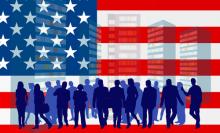
We had taught, run, and dreamed together. Our ministries were growing, I was once again flourishing spiritually, but Richard seemed to be stalled. His peers were finishing college, finding jobs and mates, and Richard was hustling to find odd jobs and was being left behind. As we tended the land, I took a risk. I asked him why he had said he did not want a family. He confessed that he had reached that conclusion out of despair. He truly wanted to find a wife and previously hoped to have kids, but he did not have citizenship (his family moved to the U.S. when he was 7 years old) and was not able to find legal, reliable employment. He could not afford to go to college without access to financial aid. He insisted he simply would not start a family that he could not reliably provide for. He had lost hope. But he still had integrity. I was deeply saddened. I was saddened for Richard and his loss of hope. I was also saddened that our community and nation would potentially be deprived of his vision and courage.
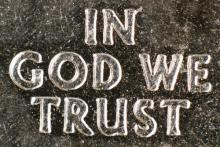
If asked, “what is the most challenging Sunday to preach a sermon?” I suspect few pastors would say July 4th weekend. But as leaders providing spiritual guidance in a country that is often associated with strong nationalistic tendencies, offering a word that speaks to the messy relationship between “God and Country” is a task that American pastors cannot take lightly.
This dilemma of competing loyalties is not new. In both Matthew and Mark, Jesus is approached by opponents who sought to trap him by asking whether they were obligated to pay Roman taxes (Matthew 22:15-22; Mark 12:13-17). An affirmative response would have been a betrayal of faith but a negative answer would be perceived as an act of sedition. Faced with this paradox, Jesus wowed his inquisitors by telling them to give Caesar what was due to Caesar and God what was due to God. Yet, as Franklin Gamwell, notes in Politics as a Christian Vocation, this only raises the question of what belongs to each of the competing authorities. If Christians are called to love God with all our being, then how can anything not belong to God? How can any other authority make a claim of allegiance on our lives?

At first I had no problem with domestic drones joining the plethora of surveillance cameras to “keep us safe.”
Big Brother — keeping his eye on me from above in stores, in traffic and everywhere else — would find my personal reality show boring. As a pastor, I’m used to living in a fishbowl. Besides, as John Calvin said, if you fear the eye of a human more than the eye of God, you have spiritual issues to address.
But then, there may be another problem with increased surveillance and flooding our nation’s skies with drones. Let’s take traffic cameras as an example.
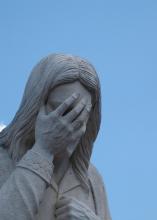
In response to my last article, “ 10 Things You Can't Do While Following Jesus,” I was accused multiple times of being political. All I was trying to do was follow Jesus. So, I thought it'd be interesting (and generate tons more hate mail) to show what a list would actually look like if I were being political intentionally. Like the first list, this is not a complete list, but it's a pretty good place to start.
There will be those who comment and send me messages berating me for “making Jesus political.” It's OK. Fire away. Jesus didn't worry much about stepping on political toes, and the Bible insists that governments be just toward the least of these (the books of the prophets alone make this point very clear). Frequently, people who are the most vocal about not making Jesus political are the same people who want prayer in school and laws based on their own religious perspectives. By a happy little circumstance that brings us to my list:
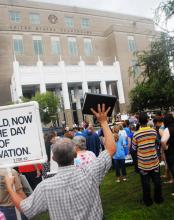
The Puritans sailed to these shores 400 years ago seeking freedom of religion, but freedom of their religion only. Earlier this year, a group of North Carolina lawmakers, apparently channeling the Puritans, tried to establish Christianity as the state religion.
Their action was prompted by a complaint filed by the American Civil Liberties Union. The ACLU noted that some county commissions and other governmental boards around the state opened meetings with prayer. While these various boards had policies that allowed for a multiplicity of religious voices, most prayers were offered in the name of Jesus Christ.
Eleven legislators, all white male Christians, backed a bill to codify Christianity in state law, saying the First Amendment to the U.S. Constitution does not trump the state’s rights. The effort died a quick and merciful death.
These misguided politicians forgot a simple truth – even if a state could mandate a public religion, that wouldn’t change what is in people’s hearts. As Roger Williams wrote in June 1670, “Forced worship stinks in God’s nostrils.” Williams, who was expelled by the Puritans and founded a religious colony in Rhode Island, knew firsthand the importance of religious freedom.

Now that you’re joining the Patriots, I’d like to offer you a few pointers on your new regional home. I realize that, to someone from the deep South, this may seem like just another part of Yankeedom, but New England is really a different place than New York. And given what happened in the Big Apple last year, I’m sure that’s good news, and the less said about it the better.
Anyway, New England is a great place to get a graduate degree, and you could not find a better institution than the U. of Foxboro to do advanced work in the liberal art of playing quarterback, under the tutelage of Prof. Brady. A dissertation on passing might be a good idea.
Aside from football, New England has a lot of variety of the human experience: steady habits in Connecticut, socialists in Vermont, cranky individualists in New Hampshire, a Tea Party governor in Maine, a Republican-turned-Independent-turned Democratic governor in Rhode Island, an African-American governor in Massachusetts. But wherever you go in this fair territory, same-sex couples can get married. That’s how we roll.

Why would evangelical Christians want anything to do with public schools? Judging from decades of culture war rhetoric, these are bastions of secular humanism where God and his fearers are unwelcome. School prayers — not allowed. Teaching creationism — verboten. Abstinence-only sex education — few to be found. Sharing the gospel openly — forget about it.
Little wonder, then, that many evangelicals withhold their support, and kids. And through their support of conservative politicians and policies, evangelicals have been, broadly speaking, part of a political dynamic that has shrunk support, financial and otherwise, for public schools.
But there is a serious problem with this flight from public education. Evangelicals are realizing there are real human beings in those left-behind schools who are struggling to teach and learn against difficult odds, and the future well-being of those kids and our communities depends on their success. Shouldn’t Christians with hearts full of love and compassion be helping them?

On Slate, Emily Bazelon laments her colleagues’ lack of outrage at the revelations of the National Security Agency’s vacuuming up of data on what all of us are doing. In the New York Times, Ross Douthat explains it in terms of an internet motto: “abandon all privacy, ye who enter here.”
Privacy is soooo 20th century, no?
Yes. We now live in a world where we are constantly making choices that trade our privacy for convenience, from Easy Pass to global positioning to, of course, all the on-line services and commerce that we indulge in. No wonder the collective yawn at news that the federal government is doing what we assume Google is doing, in the (presumed) interest of public safety.

Nearly 35 years after conservatives launched a takeover of the Southern Baptist Convention, a new divide is emerging — this time over the teachings of 16th-century Reformer John Calvin — that threatens to upend the nation’s largest Protestant denomination.
When Southern Baptist delegates gather for their annual meeting next week in Houston, they’ll be presented with a report, “Truth, Trust, and Testimony in a Time of Tension,” that focuses on the growing popularity of Calvinism among Southern Baptist pastors and seminaries.
At stake are fundamental beliefs on who can be “saved,” the need for evangelism, and whether Baptists will retread familiar battlefields on the proper roles of men and women.
Bishops in the Church of England, who had strenuously opposed a bid to allow same-sex marriage, signaled that they won’t try to derail the bill after an overwhelming vote of support in the House of Lords.
Church of England spokesman Steve Jenkins said that in the same way the church will eventually allow women bishops, England will eventually allow same-sex marriage.
“It doesn’t mean the Church of England is happy, but that’s where our government is going,” Jenkins said. “Now it’s about safeguarding people’s right to hold religious beliefs.”
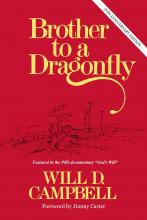
[Will Campbell] confused his critics – first the Right and then the Left – by insisting that his soul did not belong to any team – racial, political, religious, cultural. It belonged to the Kingdom of God. There was only one team, and that was the family of ALL God’s children everywhere.
Compassion came first in his hierarchy of values. Compassion led him to campaign for justice in the Civil Rights Movement, and compassion led him to sip whiskey with the cross-burners in the rocking chairs on their front porches. His was a ministry of reconciliation, a living, idiosyncratic expression a bold declaration of the biblical Gospel that God was in Christ reconciling the world to God’s own self.

After traveling the country this spring — while keeping an eye on Washington, D.C. — I am more convinced than ever that our personal decisions, choices, and commitments will change the world more than our politics. The message in the Epilogue to On God’s Side says this as well as I could do again. It’s short and very practical. Here it is:
The common good and the quality of our life together will finally be determined by the personal decisions we all make. The “commons” — those places where we come together as neighbors and citizens to share public space — will never be better than the quality of human life, or the human flourishing, in our own lives and households.
Here are ten personal decisions you can make to help foster the common good.

For over half a century, Gallup has been asking Americans whether they think the influence of religion is increasing or decreasing in the U.S., posing the intriguing question of what the results actually signify.
For starters, it’s worth bearing in mind that Western civilization is grounded in the belief that once upon a time, God was in his heaven and people went to church regularly. So at any given time, more Americans are likely to think the influence of religion is in decline than the other way around.
That said, what accounts for the rather striking ups and downs in the chart? In its latest release, Gallup emphasizes that these do not reflect changes in personal religiosity — and I’m inclined to agree, up to a point. Here’s the story I’d tell about the people’s perception of religion’s influence.
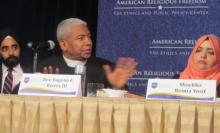
In a conference full of people who champion traditional religious values, Amardeep Singh knew that everyone might not appreciate his recounting of the “uncomfortable” cab ride he had taken the previous day.
Singh, a featured speaker at the second annual National Religious Freedom Conference in Washington on Thursday, told the several hundred attendees that his D.C. taxi driver had the radio tuned to a religiously minded commentator, who was explaining that women become lesbians because they had been abused.
His cab story — both his telling and the reaction to it — reveals fault lines in the coalition of Americans concerned that government and popular culture are eroding religious freedom and trying to banish religion from the public sphere.
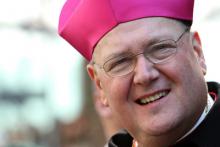
NEW YORK — When Cardinal Timothy Dolan used the morning talk shows on Easter Sunday to say the Catholic Church could do a better job of welcoming gays and lesbians, his remarks were hailed by one activist as an “Easter miracle” and by another as an encouraging “first step.”
But two months later, it’s still not clear what the second step in this fraught process might be, or even if there is a second step. And there are signs that things may only get more complicated.
Since Easter, three more states have passed same-sex marriage laws, and next month the U.S. Supreme Court will hand down a gay marriage ruling that will again spotlight the bishops’ full-throated opposition to a whole host of civil protections for gays and lesbians, particularly marriage.
Moreover, as Americans — and American Catholics — grow increasingly accepting of homosexuality, and as foes of gay rights grow increasingly determined, conflict at the parish level seems inevitable. The uneasy “Don’t Ask/Don’t Tell” policy that once allowed gay and lesbian Catholics to take church positions is clashing with their increasing visibility in the form of marriage licenses or wedding announcements.
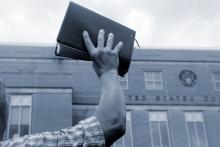
The Supreme Court agreed Monday to consider whether prayers can be offered at government meetings — a practice that’s been common in Congress and throughout the states for more than two centuries.
The religious expression case, which comes to the court from the town of Greece, N.Y., focuses on the first 10 words of the First Amendment, ratified in 1791: “Congress shall make no law respecting an establishment of religion.”
That Establishment Clause was violated, the 2nd U.S. Circuit Court of Appeals ruled last year, when the Greece Town Board repeatedly used Christian clergy to conduct prayers at the start of its public meetings. The decision created a rift with other appeals courts that have upheld prayer at public meetings, prompting the justices to step in.

CLAREMONT, Calif. — Last Sunday, Timothy Murphy began a fast of solidarity with the Guantanamo inmates who are on a hunger strike to protest their indefinite detention. As one of our Ph.D. students and an ordained minister in the Christian Church (Disciples of Christ), Timothy felt spiritually called to the hunger strike. He is drinking water and nothing else.
Timothy intends to continue as long as he is able, or until the Obama administration begins taking action to address the prisoners’ legitimate grievances, including deliberate steps to find homes for the 86 prisoners who have been cleared for release. Timothy says he would be happy to stop the fast tomorrow if the administration indicated that it was taking steps to do this.
I, like Timothy, believe this is a basic human rights issue for the prisoners. I also believe that it is critical for the health of our nation’s collective soul and integrity to get it resolved. Timothy’s deep commitment inspired me, so I decided to join him, but in a more limited fast: I am fasting three days this week, and every Thursday hereafter, until steps are taken to resolve the Guantanamo issues.

When Oklahoma voters overwhelmingly approved a 2010 ballot measure that prohibits state courts from considering Islamic law, or Shariah, the Council of American-Islamic Relations filed a lawsuit within two days challenging the constitutionality of the measure, and won.
But when Oklahoma Gov. Mary Fallin signed a similar measure, one that its sponsor said would forbid Shariah, on April 19 of this year, no legal challenges were mounted.
Why the change?
The biggest difference is that the older bill — and others like it — singled out Islam and Shariah, but also raised concerns that they could affect Catholic canon law or Jewish law. Many early anti-Shariah bills also made references to international or foreign law, which worried businesses that the new bills would undermine contracts and trade with foreign companies.
The new bills, however, are more vague and mention only foreign laws, with no references to Shariah or Islam. They also make specific exceptions for international trade. All of that makes them harder to challenge as a violation of religious freedom.
“These bills don’t have any real-world effect. Their only purpose is to allow people to vilify Islam,” said Corey Saylor, CAIR’s legislative affairs director, of the more recent bills.
Twenty-five religious leaders gathered to commit themselves to civil discourse. The meeting brought together conservative and liberal leaders. They agreed to "move politicians, congregants and Americans in general to understand that mean-spirited debate makes it all the harder to solve the nation’s problems." The Washington Post reports:
“You need some voice to say,’OK, we get that it can win elections, but maybe that’s not the best course of action.’ Typically, we think of religious leaders as voices of conscience, calling people to a better way. So therein is the hope,” said Ed Stetzer, vice president of research and ministry development at LifeWay Christian Resources.
Read more here.
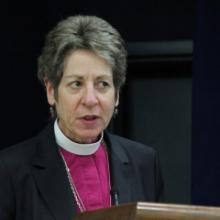
WASHINGTON — Twenty-five top Christian leaders gathered in the U.S. city with perhaps the worst reputation for civil discourse Wednesday and committed themselves to elevating the level of public conversation.
Meeting in a row house three blocks from the U.S. Capitol, the group spanned the Christian spectrum, and included officials from liberal churches and the most conservative of interest groups.
“The ground of our spiritual understanding is in treating other people as the image of God, treating people with respect,” said Episcopal Presiding Bishop Katharine Jefferts Schori.
“Faith leaders have a remarkable opportunity to shift the conversation, but it’s very challenging, particularly in a larger society that wants to understand everything as a battle, as engaging the enemy, rather than with someone who might have something to teach us,” she said.